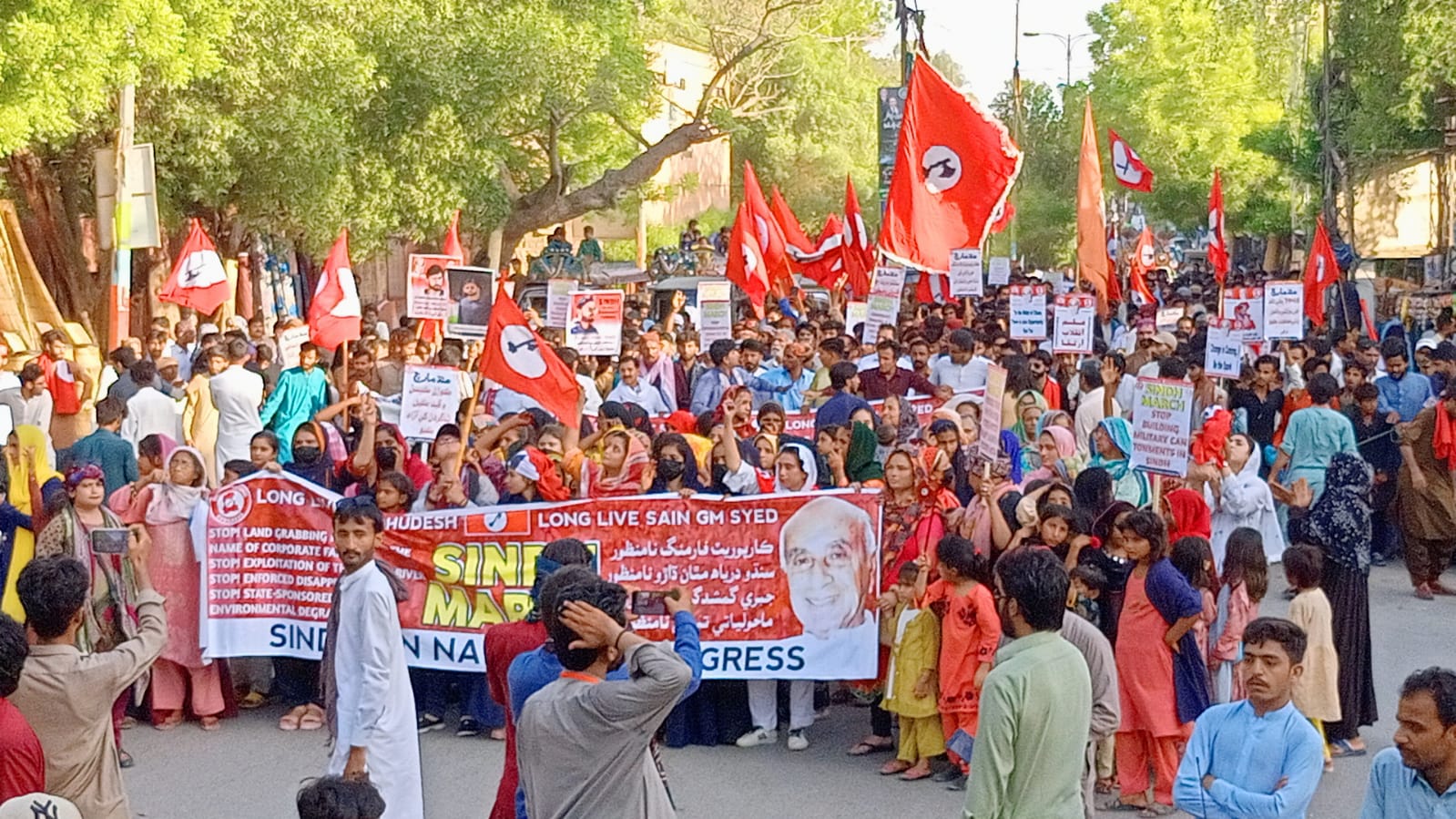In Sindh, anyone raising their voice against canals and corporate farming is being silenced, says Sarang Joyo

Karachi: “Now, I, as a senior author, am considered more dangerous than a terrorist in this country,” says Taj Joyo.
Taj Joyo, a renowned author and former chairperson of the Sindhi Adabi Board, said his house was raided by police in the early morning hours of May 19, 2025—around 4:30 a.m.
According to Taj, nearly 30 police vehicles arrived, accompanied by personnel from multiple security agencies. They stormed into his home, verbally abused, threatened, and physically assaulted members of his family. His two sons—Rooplo Joyo and Hosh Mohammad Joyo—were abducted, despite having no involvement in political activities. Taj questioned why the state would target them.
Meanwhile, the Hyderabad High Court granted bail to Taj Joyo’s two sons. Both had been named in a First Information Report (FIR) related to the Sindh March, despite not having participated in it.
The following day, Inaam Abbasi, a leader of the Sabha organization, was also abducted. He had planned to host a press conference on May 20 at the Hyderabad Press Club. On that day, police deployed in large numbers at the venue, and two young Sindhi men who had come to attend were also abducted.
On May 18, 2025, the Sindhian National Congress (SNC) organized the Sindh March in Hyderabad, which received a strong response from the public. SNC is a newly formed political party, launched by Sarang, Taj’s elder son and his colleague, Muhib Azad. Both Sarang and Muhib have previously been victims of abduction.
The SNC represents Sindhi youth and the middle class, with women playing leading roles in the party.
The Sindh March was held in protest against the construction of six canals on the Indus River and the promotion of corporate farming in Sindh province.
Over the past year, Sindhis across the province have taken to the streets to oppose these projects. Sindhis believe that the construction of canals on the Indus amounts to a form of genocide against the Sindhi people, as it would deprive the province of its rightful share of water. If the canals are built, critics warn, Sindh may never receive its due share again.
Protesters continue to raise their voices against the canal projects and corporate farming, viewing them as existential threats to their land and the Indus River.
FIR Filed Against Over 200 for Protesting Six Canals
The Rise News approached Deputy Chief Organizer of SNC, Sarang Joyo to discuss the recent abductions and the raid on his family home. Sarang explained that the Sindh March, organized by the Sindhian National Congress (SNC), was entirely peaceful.
“It was against the six canals and corporate farming,” he said. “Other political parties have held public rallies, but when SNC organized a large gathering, the police filed a First Information Report (FIR) against us under anti-terrorism laws—accusing more than 200 men, 40 women, and 8 SNC leaders.”
“How could families, who came with their children, damage private property?” he asked. “Media and local residents were present—everyone saw that the protesters were peaceful.”
According to him, the only disruption came from masked people who appeared suddenly and tried to cause chaos. However, organizers quickly intervened and prevented them from hijacking the march.
“Even if the state believes peaceful protesters are terrorists,” Sarang asked, “then would a three-year-old child in their mother’s arms also be considered a terrorist?”
Muhib Azad, an advocate and Chief Organizer of Sindhian National Congress, stated that police had intended to arrest Sarang Joyo, but he was not at home at the time of the raid. Instead, they abducted his two brothers.
He shared that the party had been receiving indirect warnings not to hold the Sindh March, but SNC chose not to heed such silent threats. When asked why SNC was targeted while other political parties continued to hold protests, Muhib explained that those parties operate within the framework approved by the state—while SNC does not.
“SNC takes a clear stance on critical issues like enforced disappearances, the six canals, corporate farming, and the control of Sindh’s natural resources—which rightfully belong to Sindhis,” said Muhib. “These positions challenge the ruling establishment, and for that, we are threatened.”
“The Sindh government has turned fascist. No voice is allowed to speak out against the six canals or corporate farming,” Sarang said. “If anyone dares to speak, they are brutally crushed.”
Still, he maintained that Sindhis would not remain silent. “We will continue to resist these anti-Sindh projects, no matter the cost,” he said.















